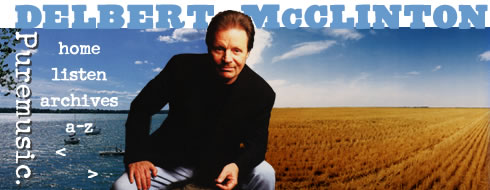
A Conversation with Delbert McClinton (continued)
PM: Well, you're a well-traveled person, to say the least. What are a few of your favorite places?
DM: Oh, man. For what? [laughs]
PM: To enjoy yourself.
DM: You mean, on stage or not on stage?
PM: Either. Just places that come to mind, like, "Well, I sure like being in..."
DM: Well, for the last five or six years, I've taken a week every year and gone to St. Barth in the French West Indies.
PM: St. Barth?
DM: It's B-a-r-t-h, as in St. Bartholomew, is the name of the island, but they call it St. Barth. And that place really gives me a lot of room to breathe.
PM: What's going on there?
DM: Well, it's a little French Island with villas just stuck inside of the hills all over the place.
PM: Wow.
DM: And you can go there and do nothing. With a beautiful pool, state-of-the-art kitchen, perfect weather. And looking out over the Caribbean aqua blue water.
PM: Nice.
DM: But that's what I like to do to relax. The other best place I like to be is anywhere where we have a great night. It doesn't matter where it is. At the end of the night, if we just say, "Wow, man, that was just so much fun," then that's the best place I could have been.
PM: Wow. What's your life like off the road? You make your home here in Nashville?
DM: I do. I've been living here in Nashville about twelve years. Nashville is a beautiful place. And the best part about Nashville is that I don't have to play the games here. I'm not a struggling artist trying to make a name. And I don't have to do all the jumping through hoops and the gripping and grinning, and going to all the things, talking to idiots that I don't want to talk to.
PM: [laughs]
DM: You know what I'm saying?
PM: I certainly do.
DM: And so that's the best part. Yet, I can drive five minutes from here and be at the best studio in the world, or whatever. And you got a whole community of songwriters to pick from.
PM: Yeah, an unbelievable bunch.
DM: It is. If you're going to be in this business, Nashville is a really good town, because everything to do with the music business is available here. And I'm talking outside of the country music business, not even including that, you know, just saying for anybody. It's all here and available, and the best there is. And right now, you can get studios pretty cheap.
PM: No kidding. Yeah, it's a shame how the studios are having such a hard time now because everybody can make a record in their house.
DM: They can make a record in their house or, you know, there's the equipment now you can carry. You can carry a briefcase that's a twenty-four track studio.
PM: That's right.
DM: The whole music business, thankfully, is going through some kind of major upheaval, which is as it should be. But it's like anything else in the world now, there's too many people doing this that shouldn't be doing it.
PM: Yeah. I don't know how the glut developed, but I think it's just a question of the home recording revolution, and then the internet that made people who made records at home think they could promote themselves. And those two things combined just created this terrible glut of supposed artists.
DM: I hesitate to say that in the sense that somebody would misinterpret it as me saying, "Well, you know, me and a few others are the only ones who ought to be doing this, and all you other people ought to quit." That's not what I'm saying, because there's a lot of very talented artists. But what happens with that glut is that it starts taking away from people making real music, until the important thing is the hair and the midriff, and whether or not this person will do anything the company tells them to do.
PM: Right.
DM: Which they will. And more often than not, they just end up looking like fools. So many people aren't thinking for themselves. They're letting somebody else call all the shots and make all the calls. And you can't do it that way--well, I won't say you can't do it, because the corporate engine proves you can do that. But the artist usually comes out of it with nothing.
PM: Yes.
DM: They're the talk of the town for a year, and then, "What ever happened to so-and-so?" Or, "Who's that?"
PM: Yeah.
DM: And it's hard--God, that's hard on people. I know guys that are just wringing their hands because they don't have a radio career anymore, and they can't get booked anywhere because they're not on the radio. And they've spent who knows how many years of their life trying to be in the music business or trying to be an artist, a front man.
PM: And banked it all on the corporation and the radio.
DM: Yeah. And you know, once you're not selling records, they're not interested in you anymore.
PM: That's a fact.
DM: And how could they be?
PM: Yeah, why would they be?
DM: Because there's a line that you can't see the end to, a line of people willing to do anything to take their place.
PM: Absolutely, every year.
DM: Oh, constantly. So, you know, it's a mess. But that's just the way that goes. continue
print (PDF) listen archives puremusic home